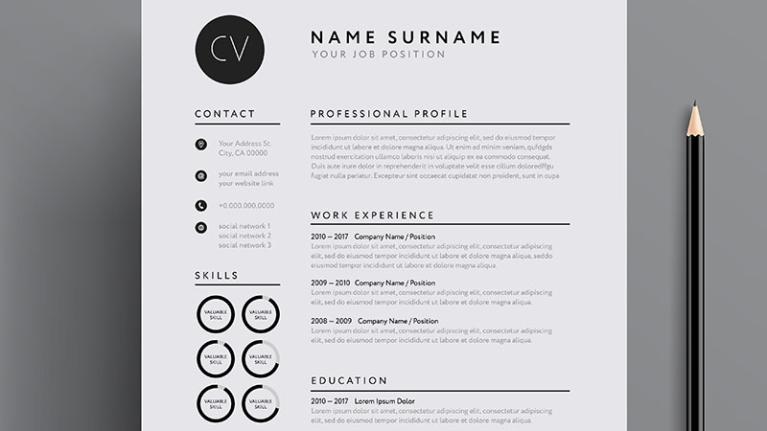How to build a graduate resume that stands out
Why is it important for your resume to stand out?
In most instances, your resume is the first impression an employer has of you, so it makes sense that you’ll want to put your best foot forward. A clear, concise and aesthetically pleasing document will be of great benefit during a recruitment process.
Whether you’re searching for a part-time job while you study, or you’re a fresh graduate looking for a full-time position, a well-crafted resume is essential for getting your career started or securing the perfect role.
Not sure what to include in your graduate resume? Or looking to tweak your existing CV for a higher hit rate? We’re here to help.
Read on to discover how to build a resume that will make you stand out from the crowd.

Understand the industry & what the hiring manager is looking for
Think of your resume as a template. While basic information such as your personal details will remain the same, you can tailor the rest of the document to specific job postings.
So, it’s helpful to keep a ‘master’ resume, that you can duplicate and tweak accordingly.
It is important to review the job posting and the company’s website before you adjust your resume. Your focus should be on the company’s culture, role expectations and any keywords mentioned in the job ad.
Consider your CV not only a reflection of your education, experience and talents, but of how you think. If you’re seeking a role in a creative industry, then it stands to reason employers will be drawn to a resume with a bit of flair. On the other hand, if you’re seeking work in an industry like healthcare, construction or business, you can demonstrate that you are neat, organised and sensible.
Structure & information to include
Most graduate resumes can be structured and organised into the following sections:
Heading & contact details
Use your name as your heading on your resume. There's no need to include the words 'resume' or 'CV' – your name will suffice.
Next to your name, you should include essential contact details such as your:
- mobile phone number
- personal email address.
Avoid using casual or humorous email addresses, as this may give the employer the wrong impression. It’s best to have your first and last name as your email address – you can set one up for free via services such as Yahoo or Gmail.
If you haven’t already, take the time to record a professional-sounding voicemail message.
You may also wish to provide links to online profiles, such as:
- a personal website.
While it’s not necessary to add your residential address, you can specify your city and country (e.g. Melbourne, Australia).
Summary or objective
This is an optional addition to a resume that can be an effective way of capturing the hiring manager’s attention.
A summary is typically used by experienced candidates to tie together their professional experience, particularly if it has been a bit disjointed (e.g. working across industries or doing a mixture of full-time and freelance work).
As a fresh graduate student, you can use a well-worded summary on your resume to outline your career goals and the skills most useful to the company.
This added-extra can also be useful if you’re not submitting a cover letter along with your resume. Try to keep the summary concise and tailor it to the employer.
Education
Alongside your qualification or degree, you can add relevant training or accreditations to this section of your resume.
You may want to include your school or ATAR results and any relevant awards if you’re a recent graduate and they’re reflective of your academic success.
Make sure you’re listing your educational qualifications in order of their relevance. Your most recent academic achievement (such as a degree) should be first.
Where possible, include:
- the institution where you studied
- your start and completion dates (or expected completion date).
You may also consider including academic awards or subjects you studied that are immediately relevant to the job.
Experience
If you’re well into your career, you don’t need to include all your work experience on a resume. Pick your most recent jobs, or any that are similar to the role you’re applying for.
On the other hand, a graduate employee may be limited in their work experience – if they have any at all.
Employers are aware of this and may look favourably on achievements outside of traditional work experience, such as:
- volunteer positions
- freelance assignments
- part-time or casual work (be discerning with what you list here, it doesn’t need to be every job you’ve had)
- internships
- memberships to organisations such as university clubs.
Be specific. Rather than including everything, focus on the experiences relevant to the job position.
Ensure you keep context front of mind when crafting this section of your graduate resume. You may need to include a short description of an organisation you gave your time to, if it’s not immediately obvious by name alone.
If you have the space, include an overview of your responsibilities. You can also outline what you achieved, or tasks and projects you contributed to while working in the role.
Optional sections
Consider fleshing out your resume with sections such as:
- awards and accomplishments
- skills and attributes
- relevant interests and extracurricular activities, including sport, music and other hobbies.
Try to list only the skills and interests on your resume that are professionally relevant or make you stand out from the crowd. For example, an interest in reading and writing would be an advantage if you’re applying for an editorial position; drawing and art if you’re seeking work as a designer.
What information should not be included on my resume?
Avoid the following:
- personal information such as your age, marital status or number of children/dependents
- demands of an employer, such as flexible working hours or rostered days off (RDOs) – these are better mentioned in your interview or during contract negotiations
- salary details – while it’s not necessary to include this information on your resume, you may be asked to provide your salary expectations in an application or during an interview
- fabricated information – be honest and make sure you can back up any claims made in a subsequent interview
- political or religious views, or your sexual orientation – while they may be important to you, it’s not essential information for a work place and can even lead to unconscious bias.
Should I include references in my CV?
No, references aren’t necessary on a resume. Most checks are done at the end of the recruitment process, after candidates have been interviewed.
Likewise, don’t bother including a line stating your ‘references are available on request’. It’s a given you’ll provide references if an employer asks for them, so this line will simply take up valuable space on your CV!
Should I include a photo on my CV?
In Australia, it is not considered necessary to include your image on your CV.
Under Australian law, it is forbidden for an employer to ask a candidate for information that can be used to discriminate against them. Revealing your age, race, religion, any disabilities or your marital status could lead to conscious or unconscious bias, which is why it’s best to omit personal information from your resume.
There are occasional exceptions to this rule, particularly for roles in the modelling or acting industry. But, in most cases, a picture will take up space you can use to sell yourself and prove your suitability for the job.
The requirement for an image can vary from country to country. Seek advice on what is considered best practice if you’re looking for employment opportunities overseas.
It is probable that a potential employer will look for you on LinkedIn or other professional social media. Consider the following, when choosing pictures for your accounts:
- choose a professional-looking photo, such as a front-facing headshot, against a plain background
- use a high-resolution image that isn’t blurry
- make sure the image is recent or, at the very least, not dated
- avoid the use of selfies or group shots taken in social situations
- use an image that gives an overall impression of your career experience
- avoid avatars, memes or cartoons.

Be clear & concise
As an entry-level candidate, you should create a resume of one or two pages.
Keep the language simple, so the average person can understand it. Likewise, avoid using technical jargon or buzzwords. The first person to read it could be a recruiter or a member of an HR team, who may not possess knowledge specific to the role.
Your CV should feature information that makes you stand out from the competition. This also means only including skills that are valuable and relevant to the position.
Use an appealing design & layout
While there’s no perfect format, there are ways you can make your resume stand out, through the layout and formatting.
Ideally, it should be easy for hiring managers or recruiters to quickly skim through your resume and immediately pick up the key points about your education and work history.
Here are some points to consider when designing your resume:
- use a clear font that is easy to read, such as Calibri
- your font size should be at least ten, or ideally 11 or 12
- use headings, subheadings and bullet points to add clarity
- use bold and italics to draw attention to key points
- strategically use white space to make your resume seem less crowded.
Depending on your industry, you can add colour to make your resume stand out. This could be a colour scheme, or just a primary accent colour.
If you’re using a light background, make sure the colours are contrast and dark. Avoid using colour for the body of your text, as you want it to be readable. Instead, opt for black or a dark grey.
What file type should I use for my resume?
After building your resume in Microsoft Word or any other word processor, save the file as a PDF.
This will ensure that it’s accessible no matter what device or program the hiring manager is using. It also ensures that your formatting will stay in place.
Give the PDF a professional sounding title, such as ‘firstname-lastname-cv’. This will give a good first impression and assist the recruiter with their own file management.

Proofread, proofread, proofread
Spelling mistakes and grammatical errors can very quickly make your resume seem off-putting.
Make sure you triple-check your document before submitting to a potential employer. A document free from mistakes indicates professionalism and attention to detail.
You can also ask a friend or family member to proofread your CV. A fresh set of eyes can help pick up any oversights.
Include a cover letter
Not every employer requires a cover letter to be submitted. Often, hiring managers and recruiters can glean what they need from a CV alone.
Even if it isn’t a requirement, attaching a cover letter can help your application stand out. It’s an opportunity to demonstrate your suitability for the role or company.
As with your resume, be clear and concise with the points in your cover letter. Show, don’t tell, by using evidence-based claims to demonstrate you have the right qualities for a role.
Consider using a matching design and colour scheme for both your resume and cover letter, for a professional, cohesive look.
Include a cover letter

Reach out to your network
As a fresh graduate, it can be beneficial to arrange interviews with industry experts, to glean knowledge that can help you during interviews for potential jobs.
Connections can be sourced through teachers, alumni groups and LinkedIn.
Establishing personal connections can help you stand out among other candidates, especially when most applications are submitted online.

How will you make your resume stand out?
With the help of these tips, you should be able to create a resume that immediately sells your experience, skills and abilities to potential employers.
Need more assistance or advice? Visit our VU Careers Hub page to access career services and support.
Our career consultants can help you with:
- preparing job applications
- networking
- job search strategies.
You can also email your resume and job applications, to receive personalised feedback.
Have you been invited to an interview? Read more about our six interview tips to land your dream job.